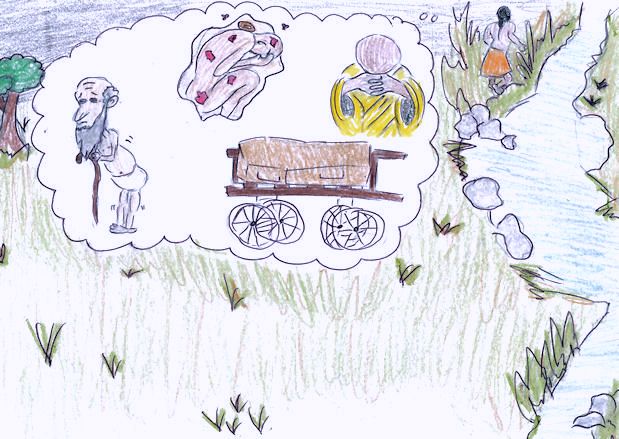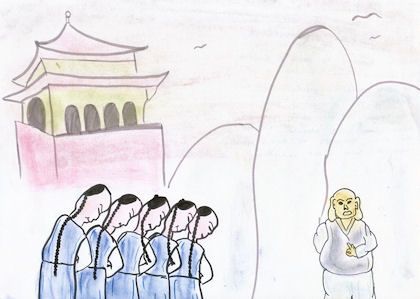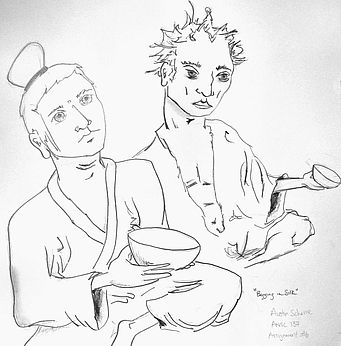
Prince Siddhartha left his family to become a wandering hermit.
Drawing by Lauren Gretz, John Muir College (UCSD), by permission
A little further along the banks of the River Anoma , there was a grove of mangos, and Siddhartha now went there and stayed for seven days.

When he heard the news of Siddhartha’s departure, King Shuddhodana was horrified. This was exactly what the prophecy had foretold him, and exactly what he had spent the last three decades trying to avoid. He immediately sent five trustworthy courtiers to try to dissuade the prince. They were:
They hurried out, and soon found the prince and asked him why he hated his family and his country and wished to leave them.
Siddhartha explained that he did not hate his family or his country but rather wished to save them by discovering how to relieve the world of suffering, and that he would do this by religious exercises.

Siddhartha had always been a wonderfully persuasive master of rhetoric, and when the servants heard what he had to say, they were completely persuaded. Ajnata-kaundinya was the first among them to decide to stay and become a mendicant himself, and to seek enlightenment with Siddhartha. Soon they had all decided to stay and become mendicants too, and to seek enlightenment with him.
Siddhartha and the five mendicants journeyed south until they reached the town of Rajagaha (Rājagṛha), capital of the Magadha Kingdom, which was ruled over by a king named Bimbisara (Bimbisāra).
In the morning Siddhartha washed in the river. Then, like other people who had left their families, he and his five companions took alms bowls and begged for their food. In India in those days, ascetics engaged in religious exercises were well respected, and people believed that it would bring them benefit to help them, so many people contributed to religious believers with their begging bowls.

But people who saw Siddhartha immediately could see that he was not like other beggars. His bearing was too princely, for one thing. And indeed, even his clothes were too princely, for he had not possessed anything truly shabby when he left his family. Although few knew who he was or how he came to be among them, they gave him only their best food.
When he had begged as much food as he needed Siddhartha left the town of Rajagaha and went to a nearby hill to eat what people had given him.
Word of him soon reached the ear of King Bimbisara, who sent one of his princes to visit Siddhartha to find out whether this strange visitor might be the missing heir of the king of Kapilavastu who had given up his throne to learn how people could avoid the suffering of old age, sickness, and death, and who had converted the five servants sent to persuade him to return home.
Once it had been confirmed, King Bimbisara went himself to the hill to try to persuade Siddhartha to come and dwell in his palace. But Siddhartha politely refused, saying he would not live again in one place till he had found what he sought: Perfect Awareness (saṃbodhi). After that he would be happy to visit.